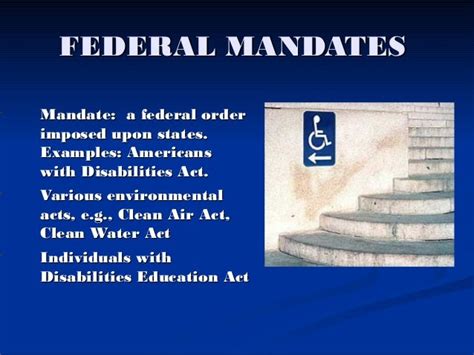Introduction

Federal mandates are directives imposed by the federal government on states, localities, or individuals, requiring them to comply with certain regulations or standards. These mandates have sparked significant debate and controversy in American politics, impacting various aspects of society, from education and healthcare to environmental protection and labor relations.
Definition of Federal Mandate
A federal mandate is a legal requirement that the federal government imposes on state and local governments or other entities. It typically takes the form of a law, regulation, or court order and is often intended to achieve national uniformity in certain areas. Federal mandates can mandate a wide range of activities, from spending specific amounts of money on a particular program to implementing certain policies or procedures.
Types of Federal Mandates
There are three main types of federal mandates:
-
Unfunded Mandates: These mandates impose requirements on state and local governments without providing the necessary funding to implement them.
-
Funded Mandates: These mandates provide funding to state and local governments to cover the costs of implementing the mandate.
-
Conditional Mandates: These mandates offer incentives or penalties to state and local governments that comply or fail to comply with the mandate, respectively.
Key Features of Federal Mandates
- National Scope: Federal mandates apply to all states and localities within the United States.
- Legally Binding: Mandates are typically backed by federal law or regulation and are enforceable by the federal government.
- Wide-Ranging: Mandates can cover a diverse range of policy areas, from education and healthcare to environmental protection and labor relations.
- Contentious: Federal mandates often generate controversy, with supporters arguing for national uniformity and opponents citing concerns about local autonomy and unfunded burdens.
Examples of Federal Mandates
- No Child Left Behind Act (education)
- Affordable Care Act (healthcare)
- Clean Air Act (environmental protection)
- Occupational Safety and Health Act (labor relations)
Federal Mandates and AP Gov
In AP Government and Politics, students study the role and impact of federal mandates in the American political system. They analyze the constitutional basis for federal mandates, the debates surrounding their implementation, and their effects on state and local governments. Students also consider the potential consequences of federal mandates on individual rights, local autonomy, and the balance of power between the federal and state governments.
Benefits of Federal Mandates
- National Uniformity: Mandates can ensure that certain standards and regulations are met across the country, regardless of local or state differences.
- Improved Outcomes: Mandates can improve outcomes in areas such as education, healthcare, and environmental protection by setting minimum standards.
- Reduced Litigation: Mandates can reduce litigation by establishing clear guidelines and procedures, reducing the likelihood of legal challenges.
Disadvantages of Federal Mandates
- Unfunded Mandates: Unfunded mandates can impose significant financial burdens on state and local governments, straining their budgets and limiting their ability to provide essential services.
- Erosion of Local Autonomy: Mandates can undermine local autonomy by limiting the ability of state and local governments to make decisions tailored to their specific needs and priorities.
- One-Size-Fits-All Approach: Mandates may not always take into account the unique circumstances and needs of different states and localities.
Tips and Tricks for Analyzing Federal Mandates
- Identify the type of mandate (unfunded, funded, conditional).
- Analyze the constitutional basis for the mandate.
- Examine the debates surrounding the mandate’s implementation.
- Consider the potential consequences of the mandate on state and local governments, individual rights, and the balance of power.
- Evaluate the effectiveness of the mandate in achieving its intended goals.
Common Mistakes to Avoid
- Assuming that all mandates are unfunded or negative.
- Failing to consider the benefits of federal mandates.
- Overgeneralizing the impact of mandates on all states and localities.
- Ignoring the constitutional and political context of federal mandates.
FAQs on Federal Mandates
-
What is the legal basis for federal mandates?
– The federal government can impose mandates based on its powers under the Constitution, such as the Commerce Clause and the General Welfare Clause. -
Who enforces federal mandates?
– The federal government enforces mandates through various means, including lawsuits, withholding of funds, and administrative sanctions. -
Can states and localities challenge federal mandates?
– Yes, states and localities can challenge federal mandates through lawsuits, arguing that they are unconstitutional or exceed the federal government’s authority. -
What are some of the most controversial federal mandates?
– Examples of controversial federal mandates include the No Child Left Behind Act, the Affordable Care Act, and the Clean Air Act. -
How do federal mandates impact state and local budgets?
– Unfunded federal mandates can place significant financial burdens on state and local governments, reducing their ability to provide essential services. -
What is the future of federal mandates?
– The future of federal mandates is uncertain, as debates continue over their effectiveness, constitutionality, and impact on state and local autonomy.
